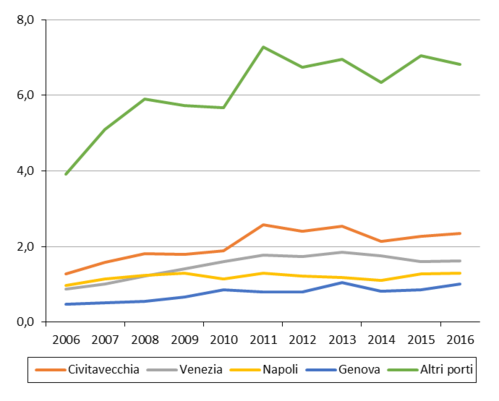
massimo.guagnini@prometeia.com
When the issue of cruise tourism is discussed, the vision that comes to mind is that of giant cruise ships passing near St. Mark’s Square in Venice. In fact, the media mainly focus on the negative impact of cruise tourism on art cities and tend to minimize its contribution to the economy of many Italian regions, also in Southern Italy.
Actually, cruise tourism is a fast-growing market, in which Italy accounts for the most relevant share (22% of passenger visits according to the Cruise Line International Association), ahead of Spain (19%) and Greece (13%). Italy’s attractiveness on international market is remarkable: 70% of passengers visiting Italian ports are foreign passengers.
The cruise tourism experienced a significant growth over the last decade, from 7,8 million passenger visits in 2007 to 10,8 million in 2016 (+38%), as a result of a combined increase in transit visits at Italian ports and in embarkations at these ports. This latter component is particularly relevant as passengers have a much higher expenditure than those of transit tourism and so it generates larger economic impacts.

The direct expenditure of cruise passengers amounts to €1,1 billion, to which other 300 million of cruise lines and crew expenditures have to be summed. The total impact on GDP is relevant, above €2 billion (also considering the induced effects).
Therefore, it’s certainly true that cruise tourism is a concern for environment and the Italian cultural heritage but it also generates a highly significant economic contribution, to be considered more closely.